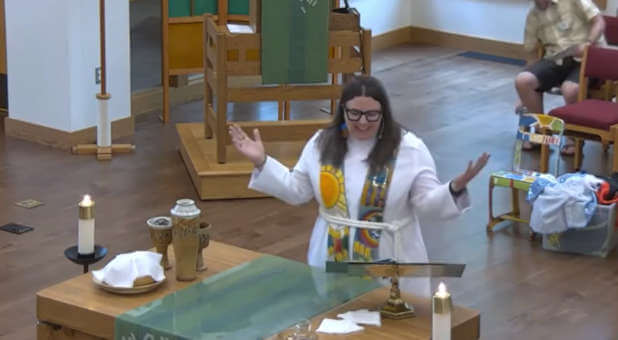A Lutheran minister has sparked controversy and captured public attention with a recitation of a heretical “Sparkle Creed” during a recent church service.
Anna Helgen,co-pastor at Edina Community Lutheran Church in Minneapolis, Minnesota, led the congregation in the recitation, which has drawn criticism for its departure from biblical teachings.
In this creed, Helgen proclaimed her belief in a nonbinary God, assigning plural pronouns to the divine. Such a portrayal deviates from the biblical understanding of God’s nature and character. The Scriptures clearly refer to God in masculine terms and emphasize the unity and oneness of the divine being (John 1:18, 1 Cor. 8:6).
Helgen’s creed also depicts Jesus Christ, the Son of God, as having two fathers and donning a fabulous tunic.
These assertions deviate from the orthodox Christian understanding of Jesus as the only begotten Son of God, conceived by the Holy Spirit and born of the Virgin Mary. Scripture affirms Jesus’ unique relationship with God the Father, not a shared fatherhood with two individuals (Matt. 26:39, John 1:14). Furthermore, there is no biblical basis for the assertion of a fabulous tunic worn by Jesus; this notion appears to be a product of personal imagination rather than scriptural truth.
Full video here: https://t.co/dEFwDlDco8 pic.twitter.com/sPUvAzNdRh
— Matt Lamb (@MattLamb22) June 29, 2023
The Sparkle Creed also includes a reference to the rainbow spirit, which is presented as shattering the image of one white light and refracting it into a diverse rainbow.
While diversity is a characteristic of creation, this creed overlooks the biblical significance of the rainbow as a sign of God’s covenant with Noah and all humankind. It is concerning that this creed seems to suggest that diversity alone should supersede the importance of God’s covenantal promises.
The creed continues with a portrayal of the church as a congregation of everyday saints, rooted in mud and captivated by wonder. While it is true that believers are called to be holy and set apart for God’s purposes, the use of language in this creed seems to downplay the unique role of Christ as the Savior and mediator between God and humanity.
The emphasis on creativity and resilience must not overshadow the centrality of Jesus Christ and His redemptive work.
The creed continues with the mantra “love is love is love is love,” which reduces the biblical concept of love to a mere repetition of words. The Bible teaches that love is a multifaceted concept, encompassing sacrificial love, selflessness and obedience to God’s commandments. It is important to understand and adhere to the biblical principles of love, rather than reducing it to a simplistic slogan (1 John 4:16).
Following Helgen’s prayer for various causes, another pastor named Jeff Sartain offered a prayer that further departed from biblical teachings.
But wait, there’s more. https://t.co/8o6QGZ9CtV pic.twitter.com/QBc8VIKysc
— Matt Lamb (@MattLamb22) June 29, 2023
Sartain’s prayer portrayed Jesus as living among marginalized groups, specifically mentioning Black trans women and babies born into the care of lesbian women. While it is essential to show compassion and care for all individuals, this portrayal seems to equate personal experiences and identities with the divine presence of Christ.
The Bible affirms that Jesus is present with believers through the Holy Spirit, but it does not endorse the idea that Jesus manifests Himself exclusively in specific social contexts or identities.
The Sparkle Creed and the prayers offered at the ECLC service are reflective of the church’s liberal stance, which prioritizes progressive values over adherence to biblical teachings. The church’s self-proclaimed mission to make a difference in the world should not come at the expense of compromising the fundamental truths of the Christian faith.
For faithful believers, it is vital to critically examine teachings and practices that deviate from biblical teachings. The apostle Paul admonishes the church in Galatia to “Examine all things. Firmly hold onto what is good” (1 Thess. 5:21). When confronted with teachings that contradict the Word of God, it is a Christian’s responsibility to lovingly correct and guide those who have been led astray, following the example set by the apostles in the early church.
James Lasher is staff writer for Charisma Media.












































